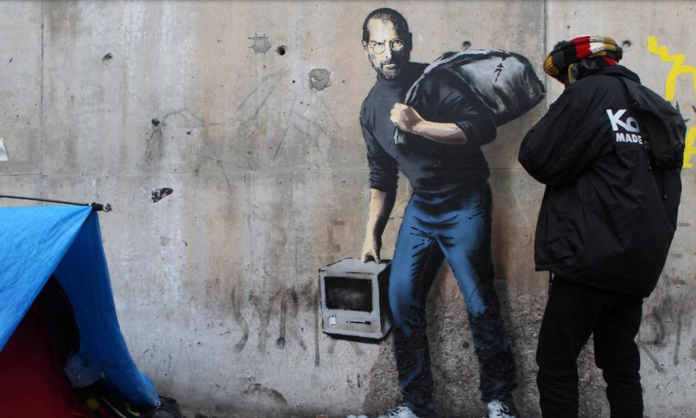“Is it a boy or a girl?”
Before we take our first breath, society sets out a path that we must follow. Before we know our own name, others presume to know a whole lot about us.
If our parents don’t know already, the midwife will glance down between our tiny legs and immediately assign a sex. Every now and then it’s not clear, which we call intersex. The usual policy is to mutilate the genitals to fit into one or the other – it’s M or F. You don’t get to choose.
Gender is not simply a “stupid idea” that we can learn away; there are real consequences to your gender. It has deep roots in every sphere of society and in every institution of power.
Experiments have found that adults who are told that a baby is female will do far less touching and picking up than with a baby they believe is male. Infants who can barely express themselves are initiated into a gendered world and expected to conform accordingly. Children who play with the opposite gender have “boyfriends and girlfriends”, their sexual futures projected onto playtime.
Schools have different uniforms, bathrooms and sporting teams for boys and girls. Girls are encouraged and expected to do well in the humanities, arts and crafts, but less so in maths or science. Boys who like drama or girls who like soccer can expect to be called “poof” and “lezzo” in the playground.
Before kids understand or experience their own sexual desires, they know which ones are punishable. Heterosexual-focused sex education compounds the feeling for gay and lesbian kids of being sick or a freak. And for transgender people – those who reject the gender that they had thrust on them – the struggle for free expression and recognition is almost insurmountable. Mental illness, self-harm and suicide are part and parcel of growing up LGBTI.
Early childhood and adolescence should be a time of socialising, discovery and experimentation. Instead, our lives are regimented by the school bell, the principal, the department of education and our parents. Gender plays a key part in this control. The rigid gender binary is everywhere, and transgression is punished through social exclusion and institutional discrimination.
So it might surprise you to find out that science has found no legitimate basis for gender roles.
Adding to a wealth of existing research, Science reported in 2015 on neuroscientists who studied the brains of 1,400 individuals to see if there were “male” and “female” neurological features. Their various attempts at gender-mapping the brain failed to account for 90-100 percent of individuals.
Gender is a category – like race, nationality, sexual desire – which is constructed and shaped by the way people interact. As people organise their societies and their economies in different ways at different times, their familial and sexual relations change with them.
So how is our society organised?
In capitalist society, a tiny minority own and control the vast wealth of the world. Production is geared towards what will create the most profits for this minority, not what the mass of people actually need. The rich throw these products onto an unplanned market, hoping to sell them for the highest possible return. Profits rule the world: to maximise them, the bosses must squeeze every ounce of work out of us at the lowest possible cost. Making workers work harder for less is therefore a central concern of the employing class.
All of this requires iron discipline and subordination in the workplace and beyond. Workers have their every movement controlled for efficiency. They are dependent on their wage for survival, and so have a reason to come back the next day for another round of exploitation. And, because workers can shut down production if they collectively withdraw their labour, they must be made to feel powerless, kept apart and pitted against each other.
With such intense and inhuman social relations, the nuclear family is a kind of glue that binds us to this daily grind, helping to maintain social stability and control over the working class.
A private place cut off from 9-to-5 industrial servitude can feel like a sanctuary for the worker. Husbands might feel they have more control in the home than they do following orders at the office. But the worker, male or female, is also disciplined by dependants at home who rely on the worker’s wage to live. The hope of quitting or slacking off is dashed by the thought of children who can’t get school uniforms or have enough to eat.
Then there’s the work that is actually conducted inside the home. Cooking, washing, raising children and caring for the sick are essential for society. Under capitalism, they keep workers replenished each day for another round of labour, and children prepared for the discipline of school and work.
But rather than being a social responsibility, these tasks are part of the private, unpaid labour that is done overwhelmingly by women in the home. The Australian Bureau of Statistics calculated the value of this domestic labour as equivalent to half of Australia’s GDP. This is not a bill that the bosses and politicians want to pay.
So the gender roles of a husband-and-wife nuclear family help to essentialise this work as a “natural” role for women that does not require compensation. Women who challenge these roles are disparaged for “not behaving like a real woman” and told to “think of your children”!
The ultra-conservative Fatherhood Foundation of Australia makes the same argument for the nuclear family and capitalism. Its pamphlet “21 reasons why gender matters” explains: “A lifelong committed marriage between a man and a woman is good for the economy as a whole”. The anchor of the nuclear family helps “married men have greater work commitment, lower quit rates and healthier and more stable personal routines”.
It is no wonder that the most wealthy and privileged in our society are also the most sexist, homophobic and transphobic: just think of the Liberal National Party and its recent gutting of Safe Schools. It is invested in the traditional family because it holds this unstable society together at crucial points and helps keep the working class under control.
None of this is natural. For the family to be accepted, people have to be socialised to accept their roles from day one. So girls are given dolls and prams to play with while boys are given trucks, and so it goes. By the time young people enter the workforce, years of intense gendering have steered them towards certain industries and work patterns. Once in the workforce, they find that women are paid significantly less than their male counterparts, which in turn reinforces the family and gender roles within it.
A comprehensive report by the Australian Council of Trade Unions shows just what a deep economic disadvantage it is to get the letter F on your birth certificate. The 2016 Gender Pay Gap Report showed that women with bachelor degrees earn $1.5m less over a lifetime than men with the same degree.
Regardless of education, women can expect a full time pay gap of 17.5 percent, and almost half will enter retirement in poverty. This wage discrimination provides the economic impetus for women to abandon paid work to fulfil their gendered role in the home, including taking primary care responsibilities for children.
Pay differences also pit workers against each other: the men will blame the women for driving down wages; the women will understandably resent the men for blaming them. The boss laughs all the way to the bank.
The mass social movements for sexual liberation of the 1960s and 1970s presented a major challenge to the family values status quo, and transformed many aspects of domestic life. Men now do much more housework and childcare than they once did. The stigma surrounding single mothers and divorce has been significantly undermined. LGBTI rights internationally have made enormous gains on marriage equality and adoption rights.
All of this is positive. But it also demonstrates that when social pressure threatens to blow the lid off the status quo, the system can accommodate alternative family arrangements without compromising its essential structure. Non-traditional arrangements fit around the nuclear norm, and in so doing adapt gender roles to new circumstances. For all the changes, the private family continues to be a closed-off unit that throws the cost of maintaining a healthy, exploitable workforce onto workers themselves. And for the individuals in it, updated gender stereotypes and expectations that fit with this reality are no less oppressive.
None of this is to blame ordinary people for their aspirations to marry, have children and raise a family. These can provide some relief from oppression. But the family simultaneously limits our horizons and too often denies us a genuinely fulfilling existence.
We work in order to support family members, but then work prevents us from developing these relationships satisfactorily. Rather than having liberating and pleasurable sex lives, we are tired and bitter after work, too busy cooking or fixing the washing machine to enjoy our bodies.
The market turns our desires into products it can sell for a buck: the $50 billion pornography and sex industries are about attaining the idealised, commodified experience of pleasure. Sexual repression for working class people is necessary to prove – as sexist advertising does from every billboard – that our bodies are not our own.
Only in a society in which human satisfaction comes before the profits of a tiny few can there be genuine liberation and freedom from the pressure to conform to gender roles. That means overthrowing the class of parasites who demand our subordination in every area of life.
Such a society would not depend on the private, nuclear family, which puts women in a hidden, subordinate place and punishes those who defy the regulations of a gender that was forced upon them. We need to remove all political content from the categories of “men”, “women”, “gay”, “straight”, “trans”, “cis” and so on. This would lay the basis for a society in which gender is either a purely personal matter, or no matter at all.










